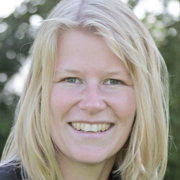 Helma Wennemers is professor of chemistry at the University of Basel, Switzerland. Her research focuses on the development of peptides as asymmetric catalysts, peptidic scaffolds for applications in the life and materials sciences as well as the use of peptides to control the formation of metal nanoparticles. She is a member of the Chemical Society Reviews editorial board.
Helma Wennemers is professor of chemistry at the University of Basel, Switzerland. Her research focuses on the development of peptides as asymmetric catalysts, peptidic scaffolds for applications in the life and materials sciences as well as the use of peptides to control the formation of metal nanoparticles. She is a member of the Chemical Society Reviews editorial board.
Who or what inspired you to become a scientist?
I hadn’t always wanted to be a scientist. At school I majored in history and English and then decided to study food chemistry. Luckily, it involved a lot of chemistry and this is when I discovered how much insight into nature you can get by looking at molecules. It is the molecular view that got me fascinated about chemistry and doing organic chemistry.
Why did you decide to specialise in peptides?
Peptides serve many different and important functions in nature and everyday life that range from hormones to toxins and artificial sweeteners. This is because lots of different tripeptides can be made by combining different variations of any three of the 21 natural amino acids. This large molecular diversity makes peptide chemistry complex but also offers exciting research perspectives. For example, I was curious to find out if peptides could function as asymmetric catalysts, a role that is currently not known from natural peptides.
What is hot in peptide chemistry at the moment?
Peptides have had a revival in medicinal chemistry because companies have started to realise that for certain therapeutic targets small molecules are just not enough. Peptides and peptide mimics are generating a lot of interest as a possible way to tackle these challenges. Aside from the medicinal aspect, the large molecular diversity of peptides has led to their use in other fields, such as nanosciences, materials chemistry, and asymmetric catalysis. 15 years ago, people would have said that there was no way a small peptide could catalyse a reaction. Nowadays, we and others have shown that this is possible. Peptide chemistry has many different facets and that keeps things exciting.
What is the key to running a successful research group?
This is a difficult question – I generally just do, without thinking too much about how I actually do it. Obviously, a certain degree of (social) intelligence is useful on top of picking interesting research projects and being a good teacher. One of the most important aspects is to be able to motivate and inspire your co-workers so that they become independent, self-responsible scientists. There is nothing more rewarding than seeing a student getting excited about scientific challenges and succeeding in tackling them.
How would your students describe you?
In some theses I get thanked for my ‘contagious enthusiasm’.
As a successful female scientist, what would you say to young women thinking of embarking on a career in science?
If you want something, work hard and you will succeed. Go your own way. Role models are important but everyone has a different path. I never got anything extra because I was female but also I never missed anything. Do what you want to do. Go for it!
You joined the Chem Soc Rev editorial board last year. What do you enjoy most about the role?
Chem Soc Rev is a terrific journal and helping to keep and enhance its quality is a great honour. In addition, I get to meet people that work in different areas of chemistry and I always find crossing such borders fascinating.
Who from the past or present world of science would you invite to a fantasy dinner party?
From my peptide interests, I’d love to invite Emil Fischer or Linus Pauling, both because of interests in the sciences but also for their broader vision on society in general. Meryl Streep would be high on my list too – I love her films. I’d also choose Plato or another hero from Ancient Greece.
What do you like to do in your spare time?
In my semi-spare time, I try to enthuse the general public, particularly children, about science. 10 year old kids are very happy customers. You see their enthusiasms, their ‘wows!’ Grown up bankers and lawyers are much harder customers but there is some hope. I also try to go as much as possible to art museums and like sports, yoga and reading. My group and I love outdoor activities like hiking and canoeing.
Find out more about Helma’s work on her website.










